I use the YouTube API, but with someone’s else wrapper. To actually show how to query an api, I go with nyt. It is simple and easy to use.
17.09.2025 23:41 — 👍 2 🔁 0 💬 0 📌 0
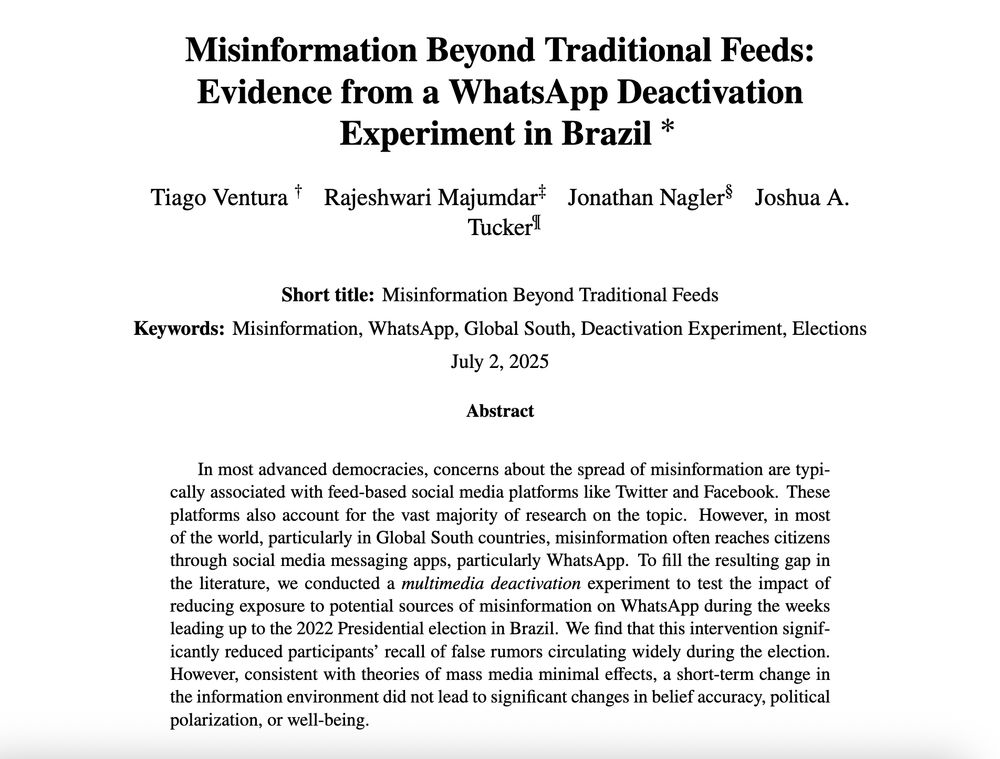
Abstract: In most advanced democracies, concerns about the spread of misinformation are typically associated with feed-based social media platforms like Twitter and Facebook. These platforms also account for the vast majority of research on the topic. However, in most of the world, particularly in Global South countries, misinformation often reaches citizens through social media messaging apps, particularly WhatsApp. To fill the resulting gap in the literature, we conducted a multimedia deactivation experiment to test the impact of reducing exposure to potential sources of misinformation on WhatsApp during the weeks leading up to the 2022 Presidential election in Brazil. We find that this intervention significantly reduced participants’ recall of false rumors circulating widely during the election. However, consistent with theories of mass media minimal effects, a short-term change in the information environment did not lead to significant changes in belief accuracy, political polarization, or well-being.
In the Global South, WhatsApp is more popular than X or Facebook.
New in @The_JOP, we ran a WhatsApp deactivation experiment during Brazil’s 2022 election to explore how the app facilitates the spread of misinformation and affects voters’ attitudes.
www.journals.uchicago.edu/doi/abs/10.1...
17.07.2025 14:51 — 👍 31 🔁 14 💬 1 📌 4
🚨 Paper now as "just accepted" at @The_JOP. We ran the first WhatsApp deactivation experiment focused on multimedia content ahead of the 2022 election in Brazil. We find a reduction in users' recall of false rumors -- and, to a smaller degree, of true news. Null effects on attitudes. Full thread ⬇️
17.07.2025 15:27 — 👍 24 🔁 4 💬 1 📌 0
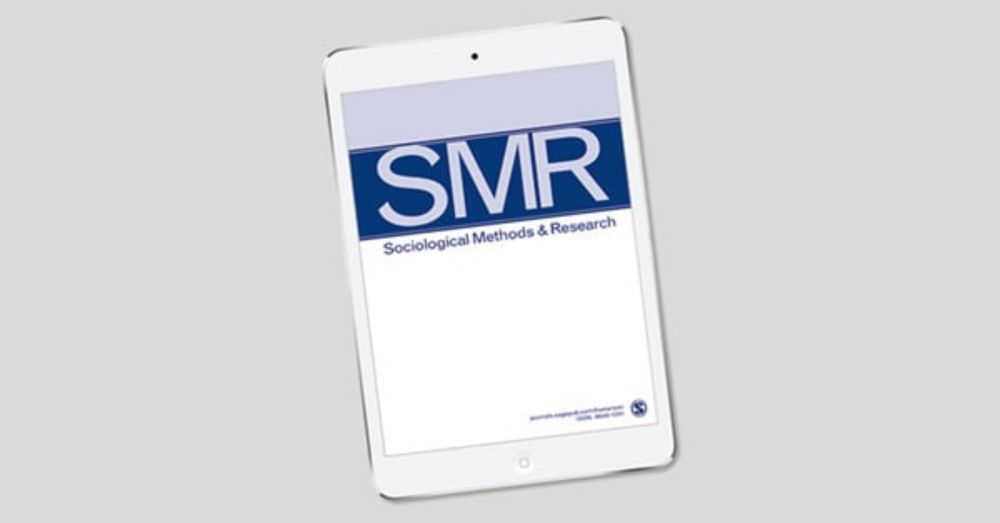
Quantifying Narrative Similarity Across Languages - Hannah Waight, Solomon Messing, Anton Shirikov, Margaret E. Roberts, Jonathan Nagler, Jason Greenfield, Megan A. Brown, Kevin Aslett, Joshua A. Tuck...
How can one understand the spread of ideas across text data? This is a key measurement problem in sociological inquiry, from the study of how interest groups sh...
I am thrilled to share a new article in Sociological Methods & Research, “Quantifying Narrative Similarity Across Languages”. My co-first author Sol Messing and our collaborators developed a new approach to measuring “narrative similarity” between texts: journals.sagepub.com/doi/10.1177/...
18.06.2025 15:56 — 👍 57 🔁 27 💬 3 📌 4

(1) "Voting for Law and Order: Evidence From a Survey Experiment in Mexico" by Tiago Ventura @tiagoventura.bsky.social and Sandra Ley
journals.sagepub.com/doi/abs/10.1...
13.06.2025 18:26 — 👍 4 🔁 1 💬 1 📌 0
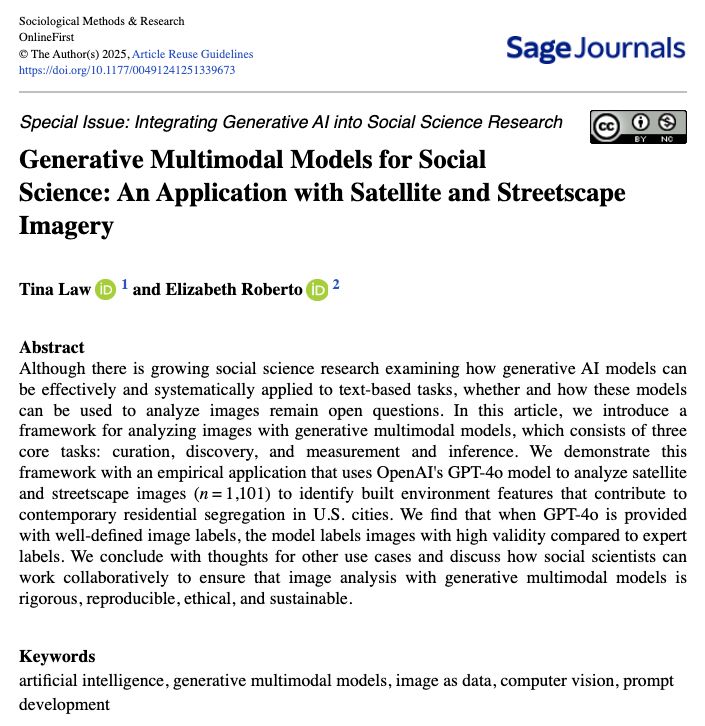
Abstract for "Generative Multimodal Models for Social Science: An Application with Satellite and Streetscape Imagery" by Tina Law and Elizabeth Roberto
New article w/ @emroberto.bsky.social out in SMR! We introduce a framework for analyzing images 🖼️ with generative multimodal models and provide an empirical application using satellite and street images. journals.sagepub.com/doi/10.1177/...
27.05.2025 13:33 — 👍 30 🔁 13 💬 1 📌 1
Looking for new research showing no backlash for misinformation corrections? Here is our recent paper:
🚨 Fact-checking increases perceptions of fact-checkers’ reputations, even for counter-attitudinal corrections to voters’ political views.
Thanks @respol.bsky.social for publishing and sharing!
26.05.2025 19:59 — 👍 4 🔁 1 💬 0 📌 0
Sage Journals: Discover world-class research
Subscription and open access journals from Sage, the world's leading independent academic publisher.
Natalia Aruguete, @tiagoventura.bsky.social
& @ecalvo68.bsky.social examine how exposure to counter- and pro-attitudinal fact-checking messages impacts voters’ perception of the fact-checker: Fact-checking increases the reputation of the fact-checker but creates perceptions of ideological biases.
26.05.2025 19:18 — 👍 3 🔁 4 💬 0 📌 1
What a game!
22.05.2025 03:06 — 👍 1 🔁 0 💬 0 📌 0
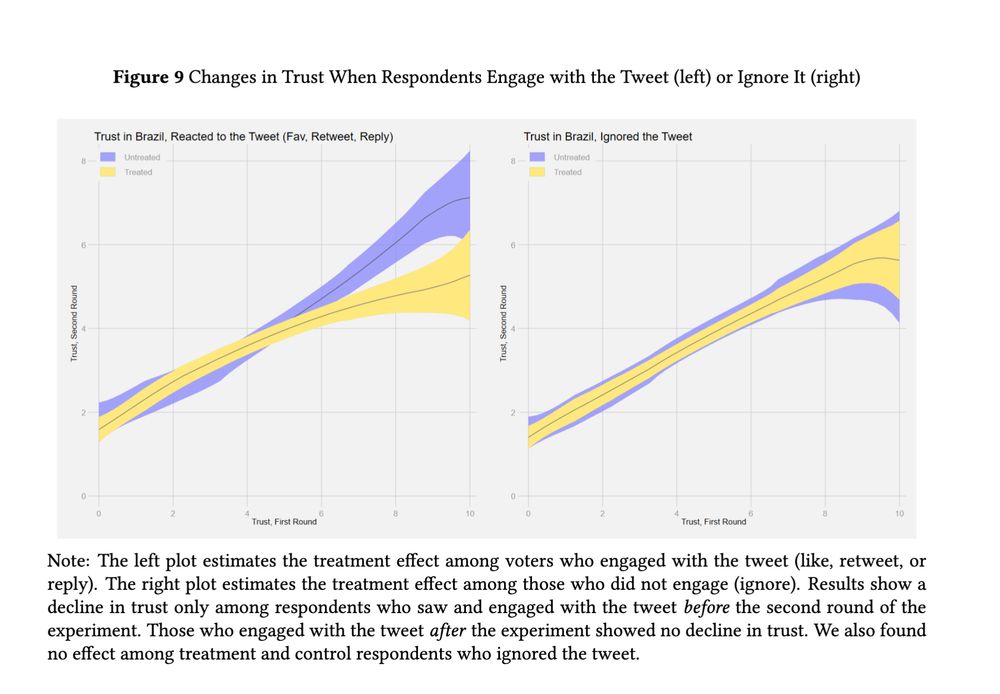
More important for social media studies:
The effect was stronger if users engaged with the tweet (like, retweet, reply).
Passive scrolling didn’t move the needle.
- But active engagement amplified distrust.
Reading isn’t reacting — and reacting shapes behavior.
19.05.2025 15:34 — 👍 1 🔁 0 💬 1 📌 0

Our main findings:
- Trust declined after reading polarizing tweets, especially when they came from out-group politicians.
- But trustworthiness stayed stable.
People still kept their promises. They just believed others wouldn’t
19.05.2025 15:34 — 👍 0 🔁 0 💬 1 📌 0

2/3 of participants were exposed to a tweet before their second decision to cast votes or entrust to others.
Tweets were:
1) Polarizing or not
2) From in-group or out-group politicians
We designed to mimic real-world political messaging during the height of Covid-19 Pandemic in both countries.
19.05.2025 15:34 — 👍 0 🔁 0 💬 1 📌 0

To make the experiment incentive-compatible, participants could win iPads by collecting votes for their chosen candidate.
They could: Vote themselves (1 ticket) or gain a larger reward if they entrust someone else to vote for them (2 tickets)
19.05.2025 15:34 — 👍 0 🔁 0 💬 1 📌 0
We test how exposure to partisan tweets affects two things:
- Trust; Do we believe others will keep promises?
- Trustworthiness — Do we keep our own promises?
We adapt a survey experiment to run an online “trust game” with 4,700+ participants in Brazil and Mexico.
19.05.2025 15:34 — 👍 0 🔁 0 💬 1 📌 0
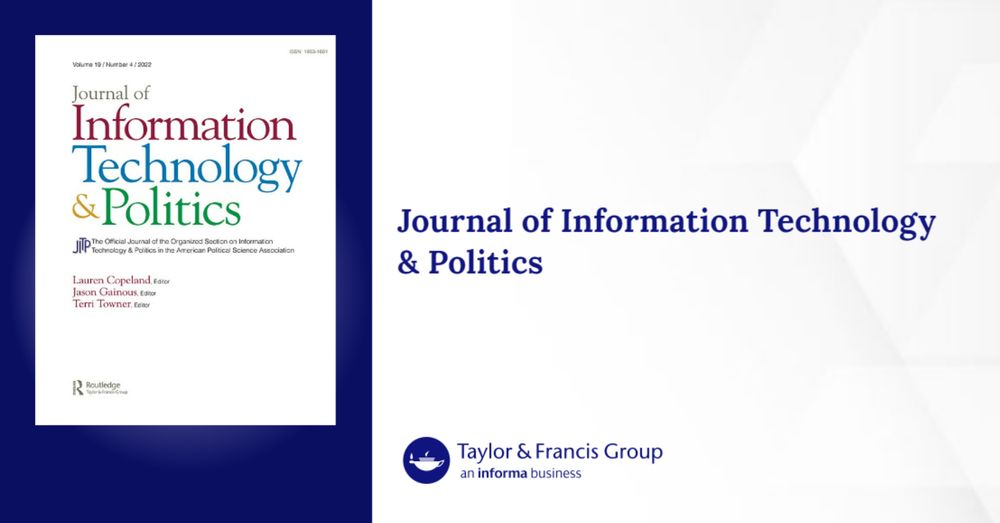
Keep your promises, even when your peers do not: a survey experiment on the influence of social media on trust
This study measures the effect of partisan and polarizing social media messages on political trust and trustworthiness in Brazil and Mexico. We implemented two survey experiments with approximately...
New publication out with Natalia Aruguete, @ecalvo68.bsky.social and Carlos Scartascini.
Do polarizing political tweets make us less trustworthy?
Not quite. But they do make us trust others less.
Our article shows how social media erodes trust, even when we stay principled.
🧵1/
19.05.2025 15:34 — 👍 8 🔁 7 💬 1 📌 0
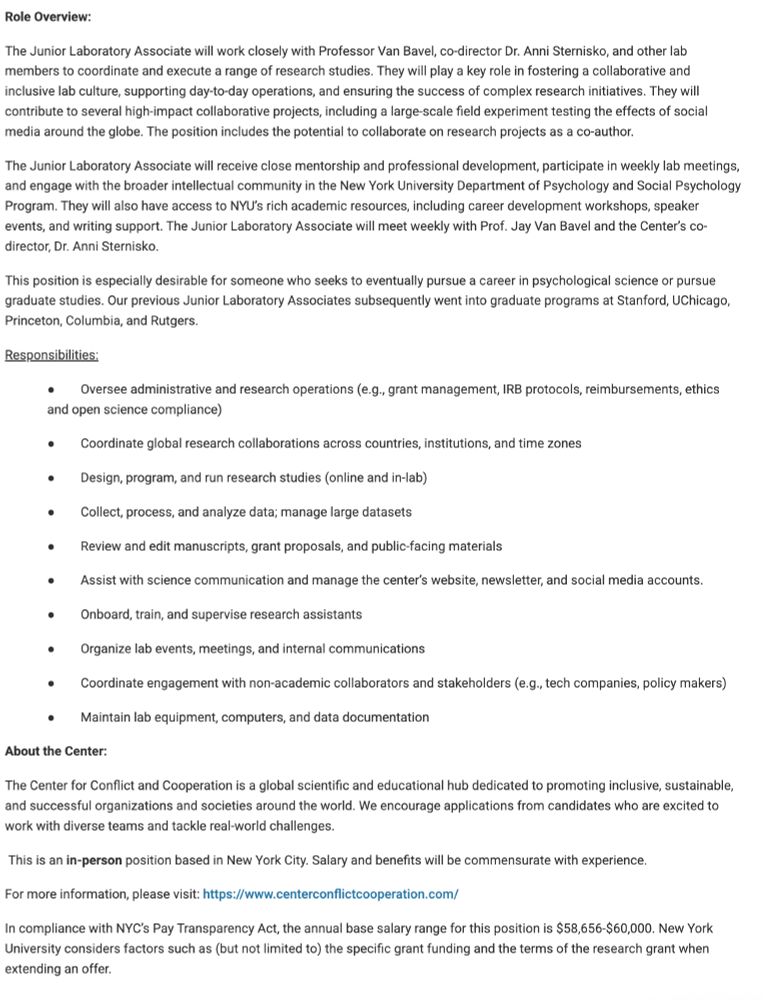
I am hiring a new Lab Manager to help run the NYU Center for Conflict & Cooperation.
We start reviewing apps on MAY 1st and it pays over $58,000. Please share with anyone who might be interested!
Please apply here: apply.interfolio.com/166620
See more details below:
21.04.2025 20:59 — 👍 88 🔁 86 💬 1 📌 3

Priority Theme Seminar Series: Truth be Told: Fact Checking in the 2019 Argentine Election – EGAP
November 4, 2021
For today’s spotlight on EGAP #polarization work: @cdsamii.bsky.social discusses a survey experiment conducted during Argentina’s 2019 presidential election on fact checking & misinfo w/ researchers @ecalvo68.bsky.social , @tiagoventura.bsky.social , & Olivia Sohr (@chequeado.com ).
20.03.2025 13:00 — 👍 4 🔁 2 💬 0 📌 0

The decade-long growth of government-authored news media in China under Xi Jinping | PNAS
Autocratic governments around the world use clandestine propaganda campaigns to influence
the media. We document a decade-long trend in China towar...
How can researchers identify covert state propaganda campaigns in China? My co-authors Yin Yuan, Molly Roberts, Brandon Stewart @bstewart.bsky.social and myself are excited to share our new article in PNAS (@PNAS): doi.org/10.1073/pnas...
Thread below.
11.03.2025 19:05 — 👍 53 🔁 19 💬 3 📌 4

Text describing a call for PhD applications at Western University in London, Ontario Canada
Please share! Have an MA student or current PhD student who wants/needs to get out of the US (or not go there)? Western is accepting PhD late apps. Info here: politicalscience.uwo.ca/graduate/gra...
Apply here: politicalscience.uwo.ca/graduate/pro...
Or contact Grad Chair: Cameron.Anderson@uwo.ca
06.03.2025 17:35 — 👍 11 🔁 9 💬 0 📌 1
I was just informed that our RCT in Bangladesh has been terminated mid-way. The project we were evaluating was helping to build resilience by forming farmer groups in 225 villages and transferring critical knowledge on smart agriculture practices in areas highly affected by climate change.
27.02.2025 13:51 — 👍 671 🔁 170 💬 37 📌 8
👇🏼👇🏼👇🏼👇🏼
25.02.2025 19:13 — 👍 0 🔁 0 💬 0 📌 0
With Ernesto Calvo and Natalia Aruguete! Still learning how to use bluesky 😜
25.02.2025 15:24 — 👍 1 🔁 0 💬 0 📌 0
Summary:
Fact-checking can preserve their reputational capital even when correcting counter-attitudinal information 🥳
But, pro-attitudinal assimilation leads to perceptions of ideological bias. This is concerning in equilibrium when the supply of misinformation is skewed ideologically 👀
25.02.2025 15:22 — 👍 1 🔁 0 💬 0 📌 0

We ran our study during the 2021 mid-term election in Argentina. Our focus was COVID-19 misinformation. We exposed 5757 respondents to REAL tweets reporting the COVID-19 cases, followed by fact-checking labels that appropriately confirmed or refuted the original publication.
25.02.2025 15:22 — 👍 1 🔁 0 💬 1 📌 0

We also show:
- When voters see a label that contradicts their prior beliefs, they do not perceive the fact-checking organization moving farther from them.
- Notice that FdT (Leftist Party) voters drive mostly of the assimilation, with no movement among conservatives
25.02.2025 15:22 — 👍 0 🔁 0 💬 1 📌 0

We show:
-Labels increase the perceived reputation of fact-checking – for pro AND counter-attitudinal labels! -
-But, pro-attitudinal labels generate ideological bias; aligned voters see the organizations move closer to them ideologically - classic assimilation effect!
25.02.2025 15:22 — 👍 0 🔁 0 💬 1 📌 0
New article out at @respol.bsky.social (w/ Ernesto Calvo and)🥳
Much has been shown on fact-checking effects on the ability to discern true from false. But.. does it affect the fact-checker's perceived reputation and ideological leaning?
Check below: journals.sagepub.com/doi/10.1177/...
25.02.2025 15:22 — 👍 5 🔁 2 💬 2 📌 0
Political Scientist - NYU
We are a multidisciplinary research centre based @royalholloway.bsky.social. We use computational methods and big data to investigate the role of social media platforms in politics, in partnership with key stakeholders and policymakers.
Social scientist studying climate change politics and social networks.
https://tedhchen.com
Postdoctoral Fellow @csmapnyu.org. Identities, political behavior, social media 👩🏻💻
PhD from UC Irvine
melinamuch.com
The Center for Media Engagement at UT Austin is a first-of-its-kind center that partners with newsrooms, social media platforms, and public and private organizations to develop research, tools, and strategies that improve media practices.
PostDoc at UZH. Formerly Clemson & UW. Technology & democracy, political misinformation, African politics, and LFC.
information•society•cats•knightfoundation.org
Opinions my own
Professor of Political Science at Stanford | Exploring money in politics, campaigns and elections, ideology, the courts, and inequality | Author of The Judicial Tug of War cup.org/2LEoMrs | https://data4democracy.substack.com
Assistant Professor at Western University | Legislative politics, gender and politics, racism and politics, and NLP (and politics). http://svallejovera.com
Associate prof of psychology Vanderbilt Univ, studies how adults and children learn true and false information, she/her, lkfazio.com
PhD Candidate in Political Science at the University of Konstanz researching Content Moderation.
🔗 https://mianahrgang.github.io
APSA Preprints is an open research platform that provides a home for early research outputs in political science and related fields. Free to submit, access, and download at preprints.apsanet.org.
SNF Agora Institute Assistant Professor of Political Science at Johns Hopkins University. Views my own.
Assistant Professor at Georgetown's McCourt School, comparative political scientist. Spend most of my time thinking about gender + bureaucracy in India.
Stephen Robert Assistant Professor of Political Science at Brown University. Representation and inclusion in democratic societies across Africa and Europe.
Supporting experimental research on governance innovations. egap.org
Sociologist, IESP-UERJ. Stratification and social mobility, life course, inequality, education, race, etc
Incoming Assistant Professor at Colby College.
Head of the EXPO Lab, studying extremism and polarization.
https://sites.google.com/colby.edu/expo-lab/home
Currently a postdoc at NYU and University of Toronto, Rotman School of Management.

















